Bavaria’s capital city is chock-full of things to do and see, including beer gardens, palaces, museums, and everything in between! This guide details the top things to do and see in Munich, no matter the season.
This post contains affiliate links, from which we may receive a commission. You can read our full affiliate disclosure here.
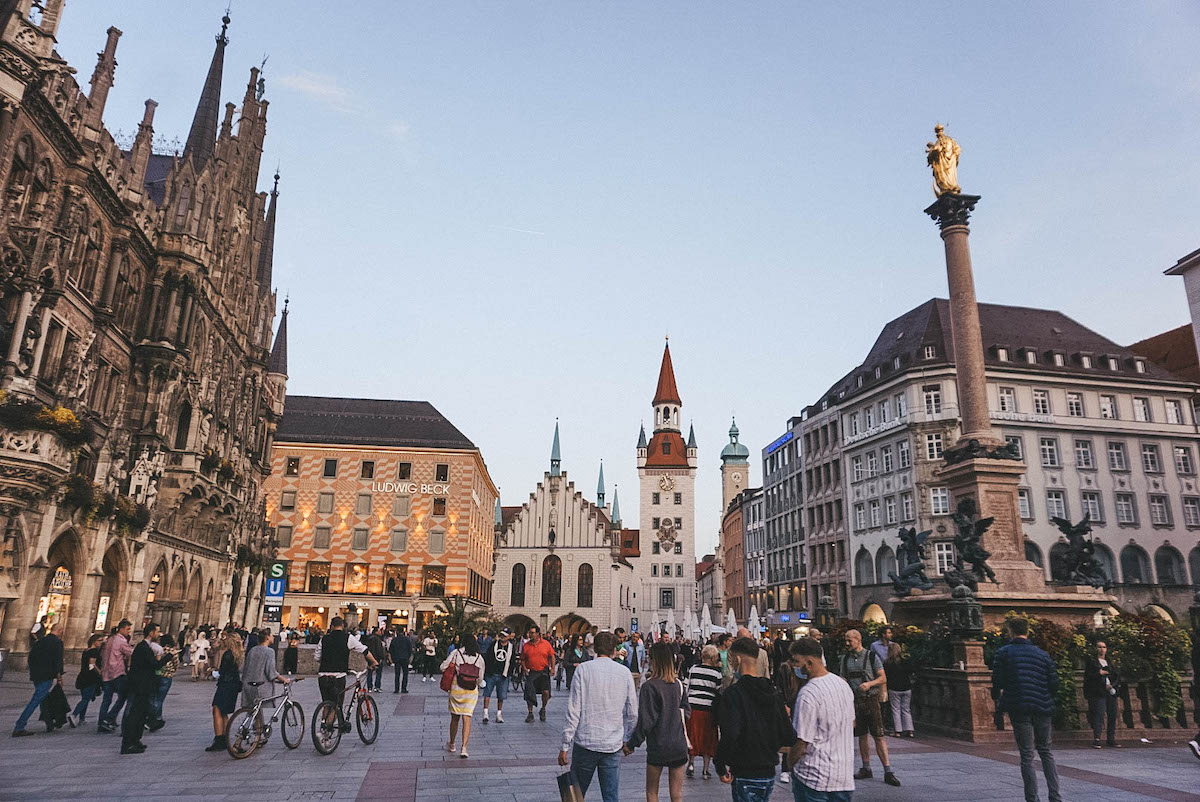
Called München in German in reference to the Benedictine monks (Mönche) who settled this area around 750 CE, Bavaria’s capital city was founded by Duke Henry the Lion in 1158.
Its long and winding history is intertwined with that of the Wittelsbach family, who ruled for nearly 700 years, as well as Adolf Hitler, who created the Nazi party and planned the 1923 Beer Hall Putsch here.
Having visited Munich several times since moving to Germany in 2019, I can tell you that its reputation for exceptional beer, lederhosen- and dirndl-wearing locals, and pride in all things Bavarian is 100% true. But there’s also so much more to Munich than what you’ve seen on TV or social media.
The true spirit of the city is best experienced first-hand, and I hope this detailed list of things to do and see in Munich helps you in the trip planning process.
Enjoy your time in Munich! -Claire
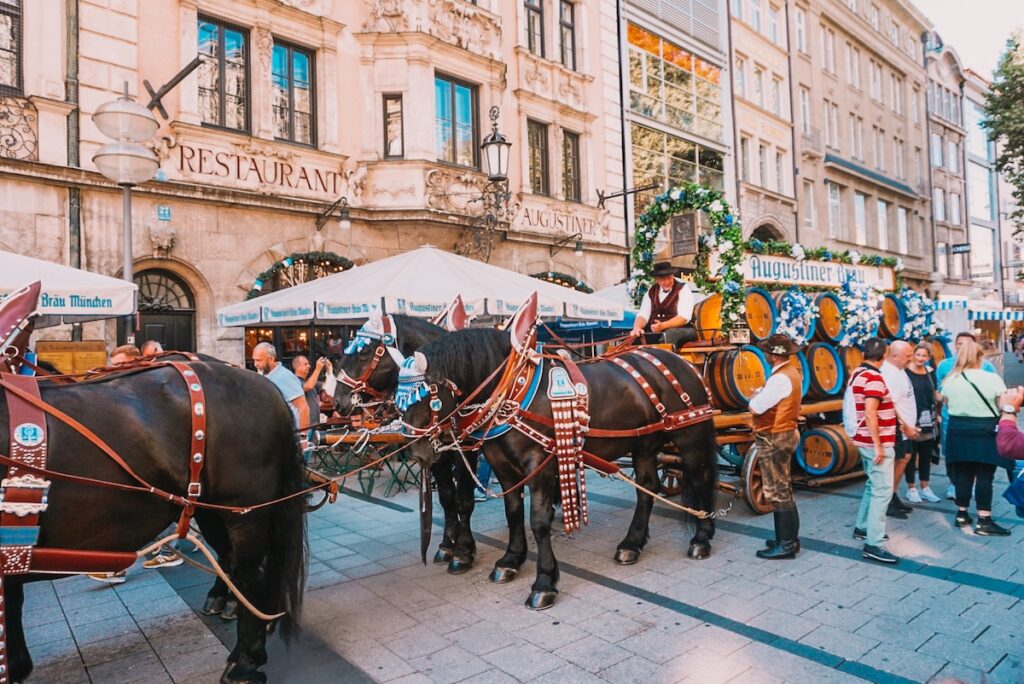
A Quick Overview: The Top 10 Attractions You Can’t Miss
This is a long guide because there are LOTS of cool things to do in Munich. If you just want a high-level overview of the absolute can’t-miss sites, here are the 10 top attractions you need to have on your itinerary.
- Marienplatz — If you’d like to see the inside of the New Town Hall, you need to sign up for a guided tour
- Frauenkirche (Church of Our Lady) — Look for the Devil’s footprint!
- Viktualienmarkt — Free to visit, or sign up for a 2.5 guided tour (with tastings!)
- Residenz (Former Royal Palace) — You can buy a combo ticket that includes the treasury or just visit the palace
- English Garden — Visit on foot or as part of a guided bike tour
- Deutsches Museum — Book tickets here
- Hofbräuhaus — Visit solo or as part of a 1-hour guided tour
- Dachau (Former Concentration Camp) — Either visit on your own for free or book a day tour or half-day tour with a local guide
- Nymphenburg Palace — Book your tickets here
- BMW World or BMW Museum — The first is a free exhibit, the second costs money but goes into detail about the company
Visiting for Oktoberfest?
Munich is in peak form during Oktoberfest, an annual fair-slash-party that takes place from the end of September until the first Sunday of October.
There’s so much to do, see, eat, and drink at Oktoberfest! You’ll want to spend most of your time in the tents — not just for drinking, but for socializing and dancing on the benches, too! — but the fairgrounds of the Wiesn are fun to explore as well.
I have a detailed guide to Oktoberfest that I suggest reading for my top tips on navigating the Wiesn and making the most of your visit to the world’s largest folk festival.
Visiting the Christmas markets?
There are 10+ markets (some of which only run for a couple of days), and I’ve written about my personal favorite Christmas markets in Munich. The guide I’ve just linked also includes tips for your visit, local foods to sample at the markets, and more.
Looking for a detailed itinerary?
This Munich activities guide is pretty long, and if you don’t want to sort through all the details yourself — I get it! That’s why I created a 3-Day Munich Itinerary. Sometimes it’s nice to have someone else do the thinking for you. 🙂
Map of the Attractions Mentioned in This Guide
The Top Things to Do and See in Munich, Germany
This list of Munich’s attractions has been compiled over the course of several visits, and during various times of year. I’ve lived in Germany since 2019 and have visited Munich more than five times and I still have things left on my bucket list!
Moral of the story: you can’t do and see everything on this list in a single visit, unless maybe you’re in town for a week or more. Reference the list of top 10 attractions above or write a comment at the end of this post so I can help you figure out where to go first.
Get Your Bearings on a Walking Tour
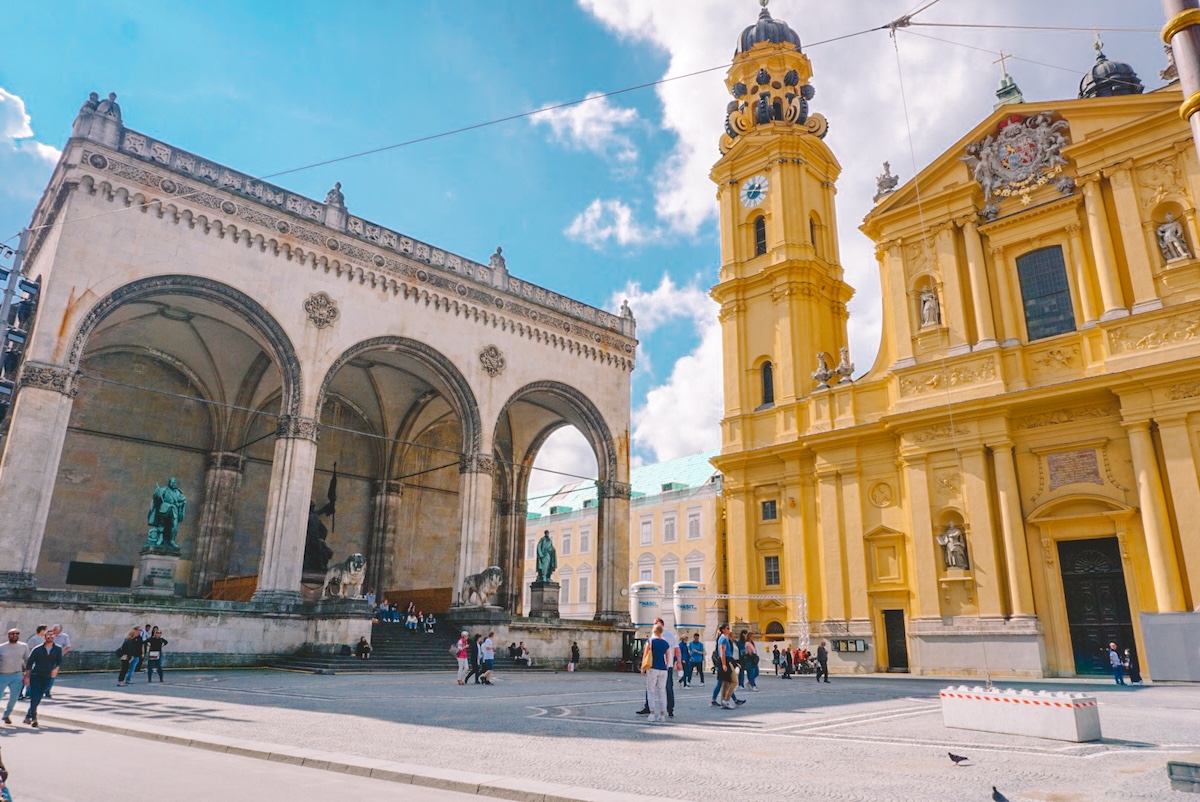
One of my favorite things to do in any new city is take a walking tour. They’re a great way to get a lay of the land and learn more about a city’s history before discovering it for yourself.
Some excellent Munich walking tours include:
- Sandemans Free Munich Walking Tour — I’ve done free tours with Sandemans all over Europe, and they’re consistently top notch. Remember to bring cash to tip your tour guide, because “free” really means “pay what you want.”
- Birthplace of the Third Reich Walking Tour — This is a sobering 2.5-hour walking tour led by Radius Tours, which is another walking tour company in Munich I really like. Munich was Ground Zero for the National Socialist party, and this is a great tour to take if you’re unfamiliar with how Hitler created his meteoric rise to power.
- Old Town Walking Tour — Munich’s tourism board does a nice 2-hour walking tour that takes you past all of the most popular attractions in the city center. This would be especially good for first-time visitors who are crunched for time and want to “see it all” in a day or two.
Take in the Sights at Marienplatz
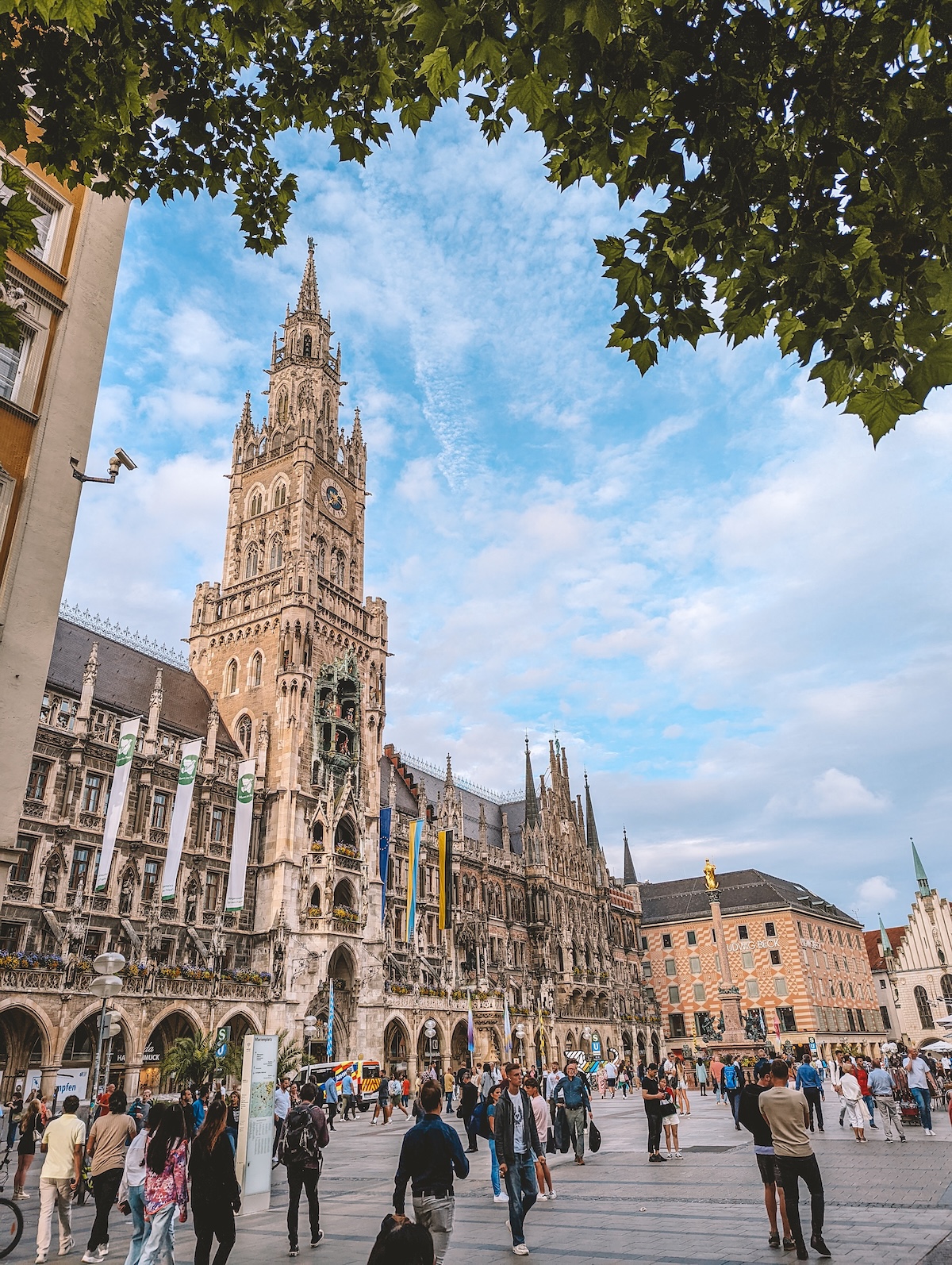
One of the places to go in Munich is the stunning Marienplatz, which is quite literally the beating heart of the city.
No, really! The Mariensäule (Virgin Mary Column) in the center of the square is the point from which Google Maps determines the distance from Munich to any other place.
Other points of interest at this historic square are the New Town Hall and the Old Town Hall.
Claire’s Tip: Try to be at Marienplatz at 11am, noon, or 5pm (summers only) so you can watch the famous Glockenspiel play on the tower of the New Town Hall. The 15-minute song accompanies a fantastic parade of figures who emerge from the clock to tell the story of a jousting tournament held to celebrate the wedding of the Bavarian Duke Wilhelm V and Renata of Lorraine.
See the Devil’s Footprint at the Frauenkirche
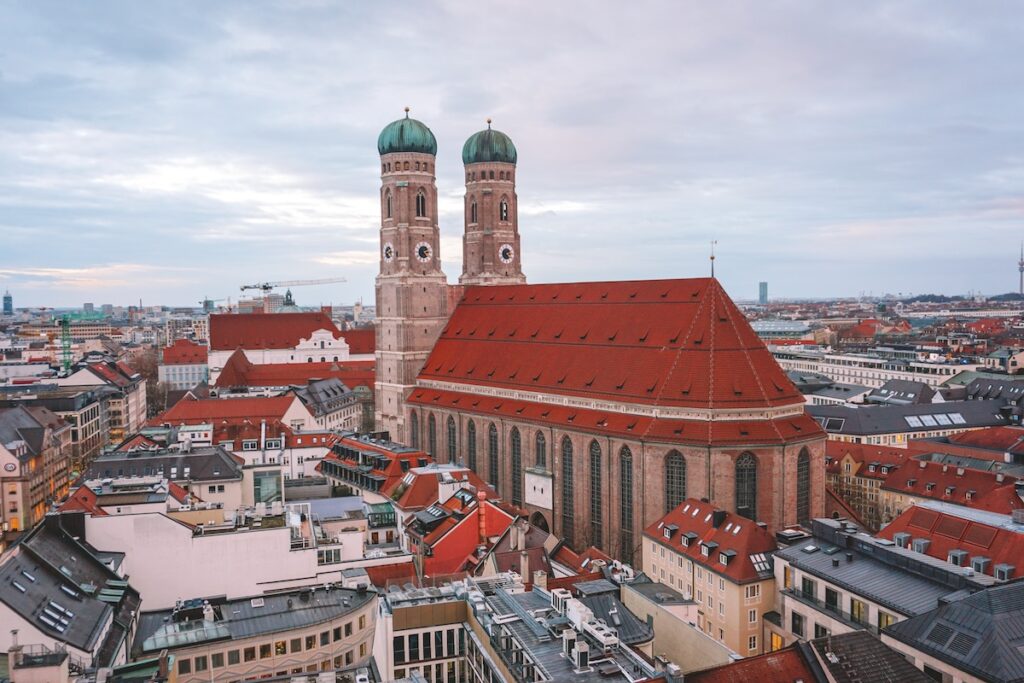
The Cathedral of Our Lady took a mere 20 years to complete, which is pretty insane considering it has two 325-foot towers that soar above the Old Town. And remember that it was finished in 1488 — so how the heck did the architect manage such a miracle?
Well, legend says that he enlisted the help of the devil himself.
That’s right, the devil told the architect he’d supply the funds needed to finish the soaring cathedral, but only if no windows were added. Much to the devil’s surprise, the architect added tons of windows!
The devil was so enraged that he stomped his foot and left a lasting impression on the floor of the cathedral. This is one sight in Munich you have to see!
Shop at the Viktualienmarkt
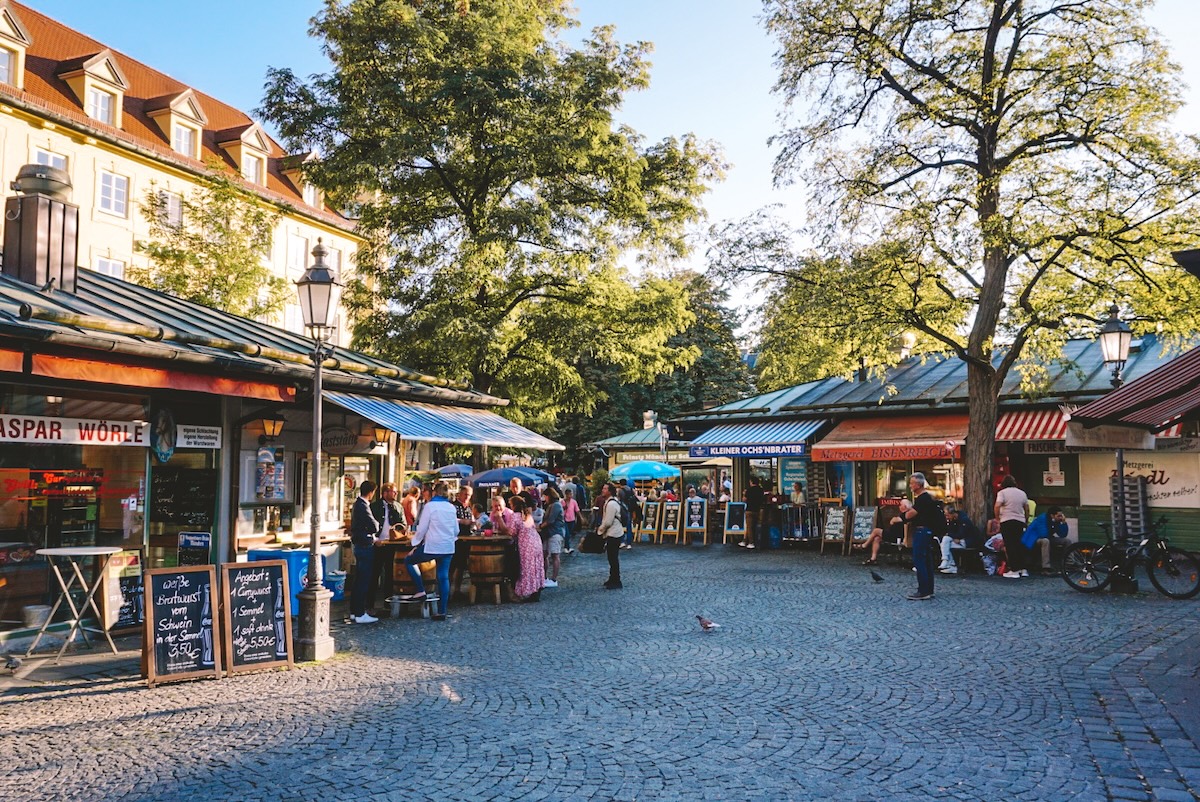
Foodies of the world, unite! One of my favorite place in Munich is the Viktualienmarkt (Victuals Market), which began as a small farmers market in the 1700s.
Today it’s the most popular market in the city, with dozens of vendors selling regionally grown fruits and vegetables, locally produced honey, sausages and meats, and so much more.
There’s also a small but pretty beer garden in the center of the Viktualienmarkt, as well as vendors selling pre-made soups, sandwiches, and other lunch fare (this is where I go to buy a budget-friendly lunch when I’m visiting Munich!).
Claire’s Tip: You can sign up for a guided tour of the Viktualienmarkt if you’re curious to know about its history and the best places to shop.
Climb the Tower of St. Peter’s Church
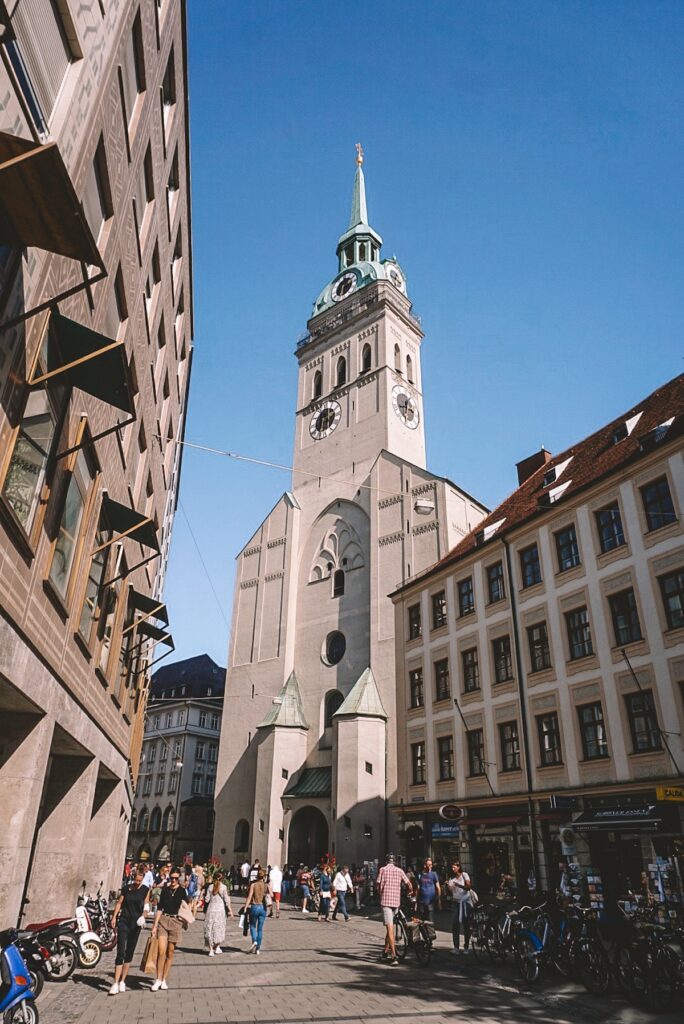
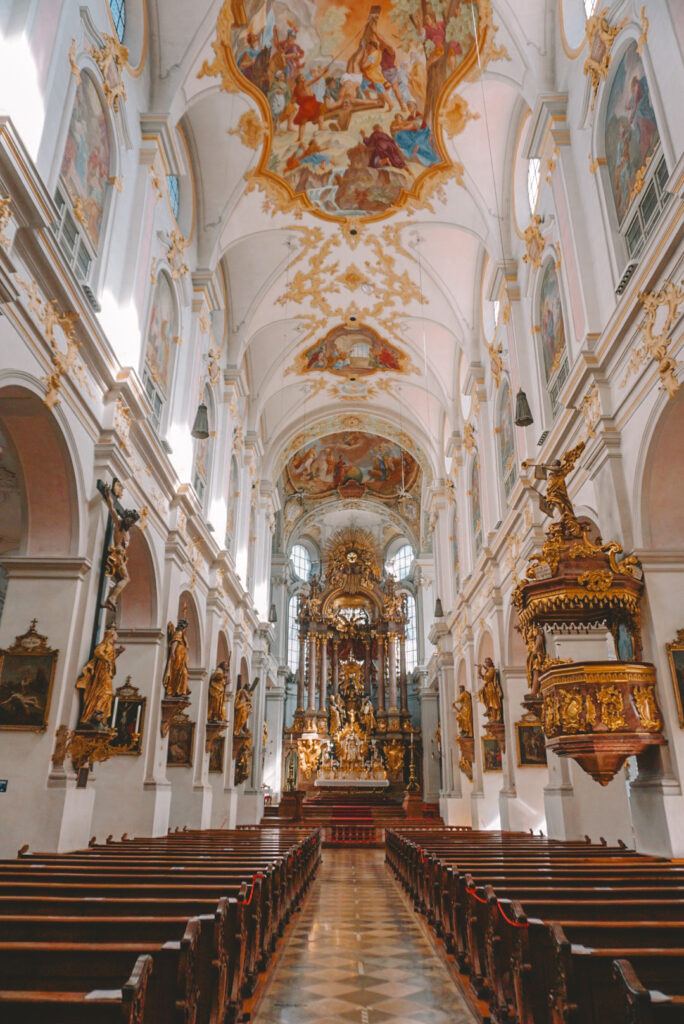
“Alter Peter” is Munich’s oldest parish church — in fact, there was a church standing on this site before the city was officially founded!
The church is free to visit and is well worth adding to your Munich itinerary. The Baroque high altar is absolutely magnificent, as are the 14 (!!) chapels around the perimeter of the church.
For an incredible view of Munich from above, you can pay 5 Euros to climb the 306 steps up to the top of the bell tower. Most people pay to climb the tower of the New Town Hall with its famous Glockenspiel, but the problem is that the New Town Hall isn’t in any of your photos!
Tour the Munich Residenz
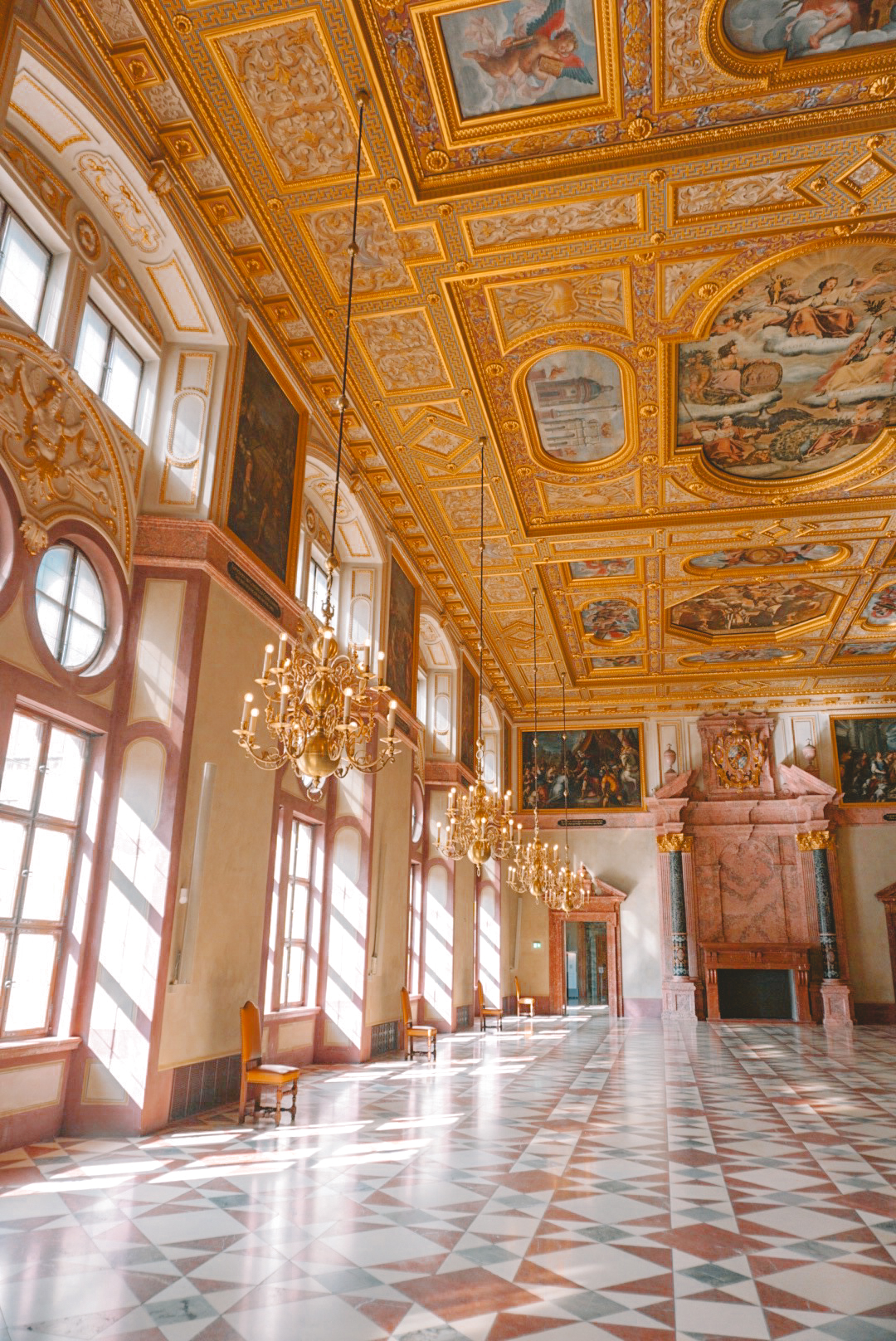
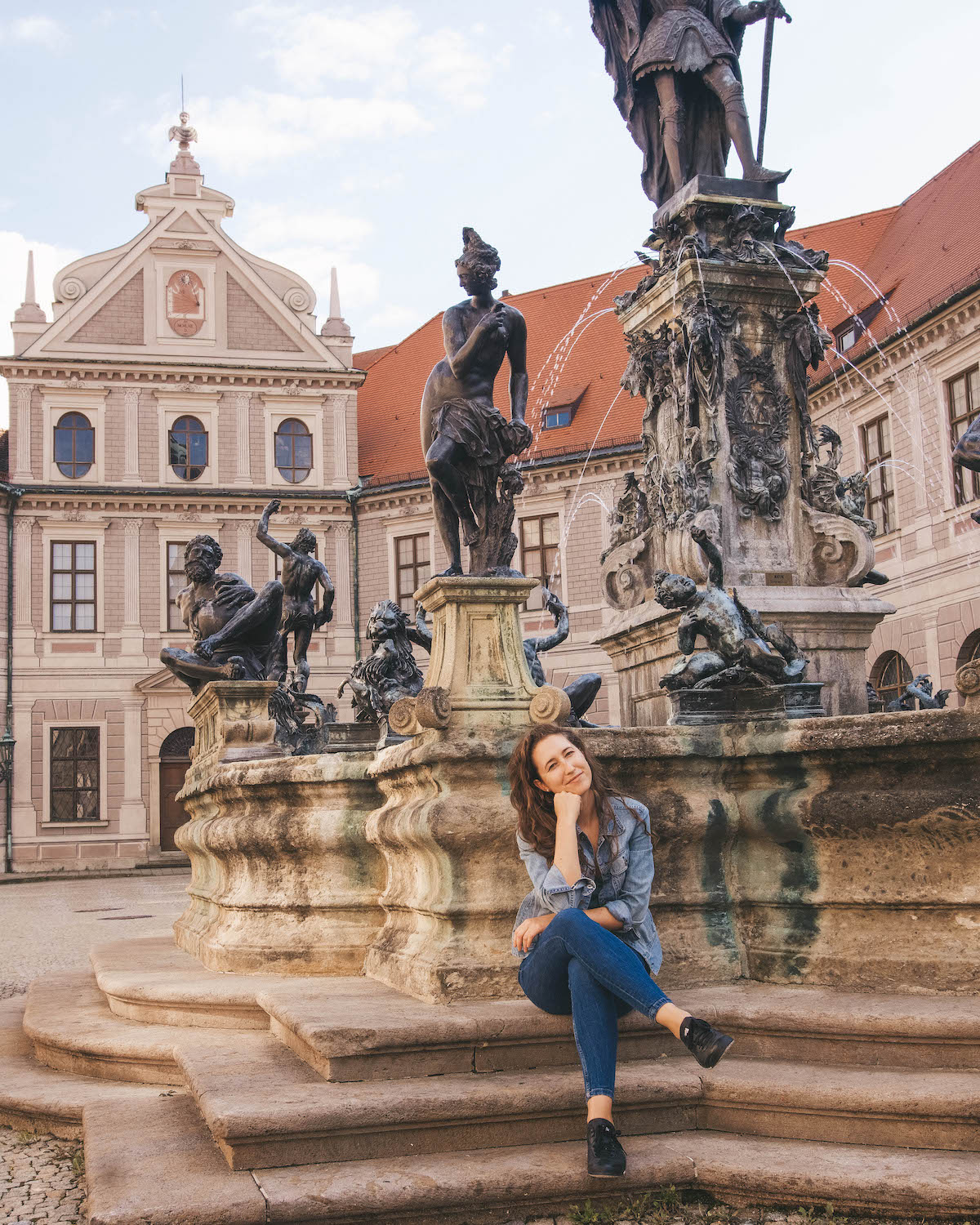
The Residenz served as the seat of government and home of the Bavarian dukes, electors, and kings from 1508 to 1918. Originally, it was a much smaller castle but each new generation added to the Residenz until it eventually became the sprawling complex it is today.
There are more than 100 rooms in the Residenz that are open to the public, all in various architectural and decor styles. Give yourself at least 3 hours to tour the Residenz alone, noting that you can also pay extra to visit the treasury and the Cuvilliés Theatre — both of which I highly recommend!
At the very least, the Residenz itself is a must. And getting to tour over 100 rooms with an audio guide for just 10 Euros is an absolute bargain!
Claire’s Tip: If you’re prone to museum fatigue, consider paying extra for a small group tour of the Residenz so you can take in the sights with ease.
Oogle the Cuvilliés Theatre
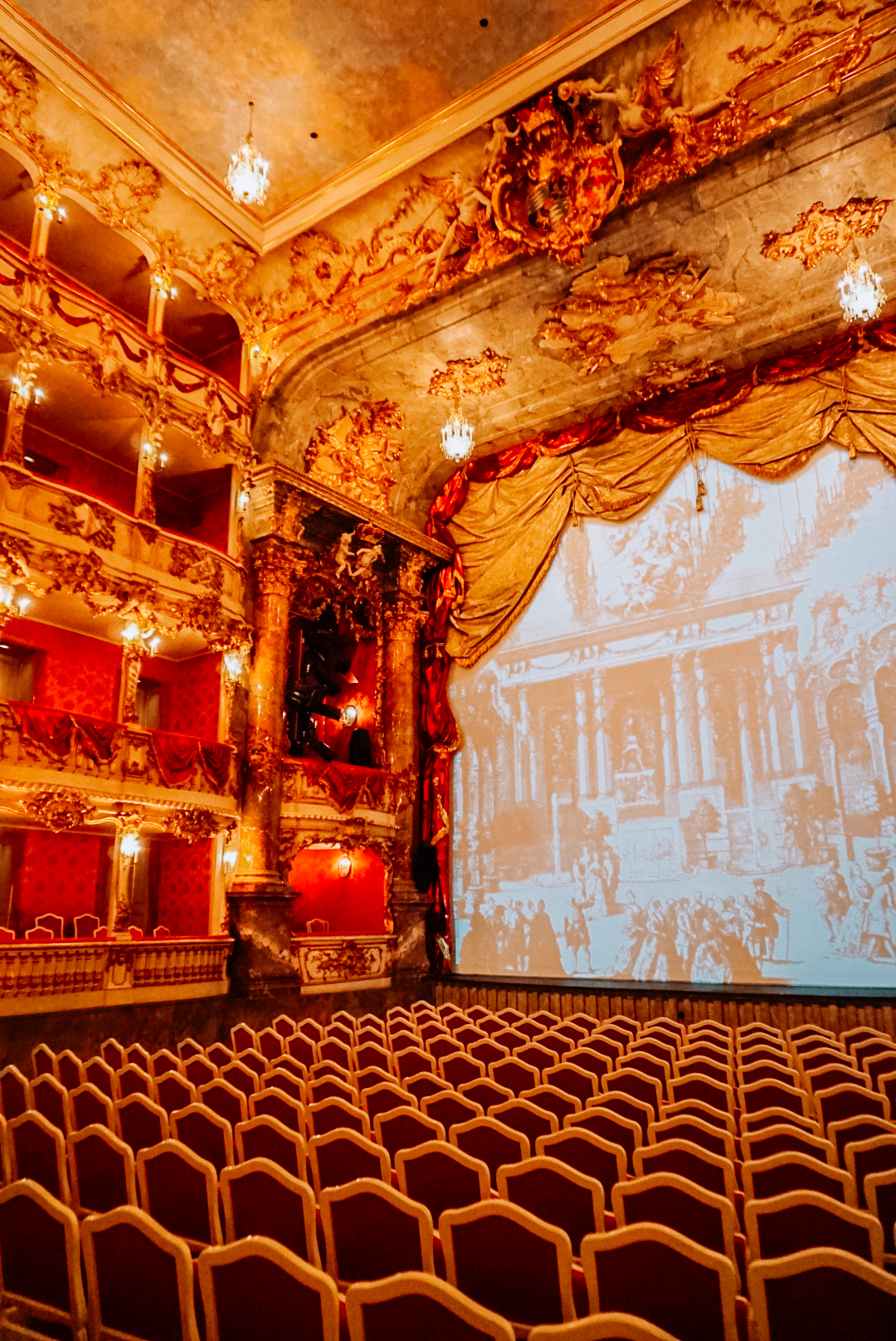
You only need 15 to 20 minutes to look around the Cuvilliés Theatre, so the 5 Euro admission may seem a bit steep. But let me tell you, it’s worth it!
The Cuvilliés Theatre was built by François Cuvilliés the Elder between 1751 to 1755 as the “new opera house” for Elector Maximilian III Joseph. The woodwork in the theatre is jaw droppingly beautiful. Stepping into the Cuvilliés Theatre truly feels like you’re going back in time!
What’s wild is that the building housing the original theatre was destroyed by an Allied bombing raid in 1944. Luckily, all of the original woodwork was moved to a safe location beforehand so what you see in the theatre today is mostly original.
Claire’s Tip: You can visit the theatre on its own, no need to purchase a ticket to the Residenz too (although they’re located in the same complex).
Relax in the Hofgarten
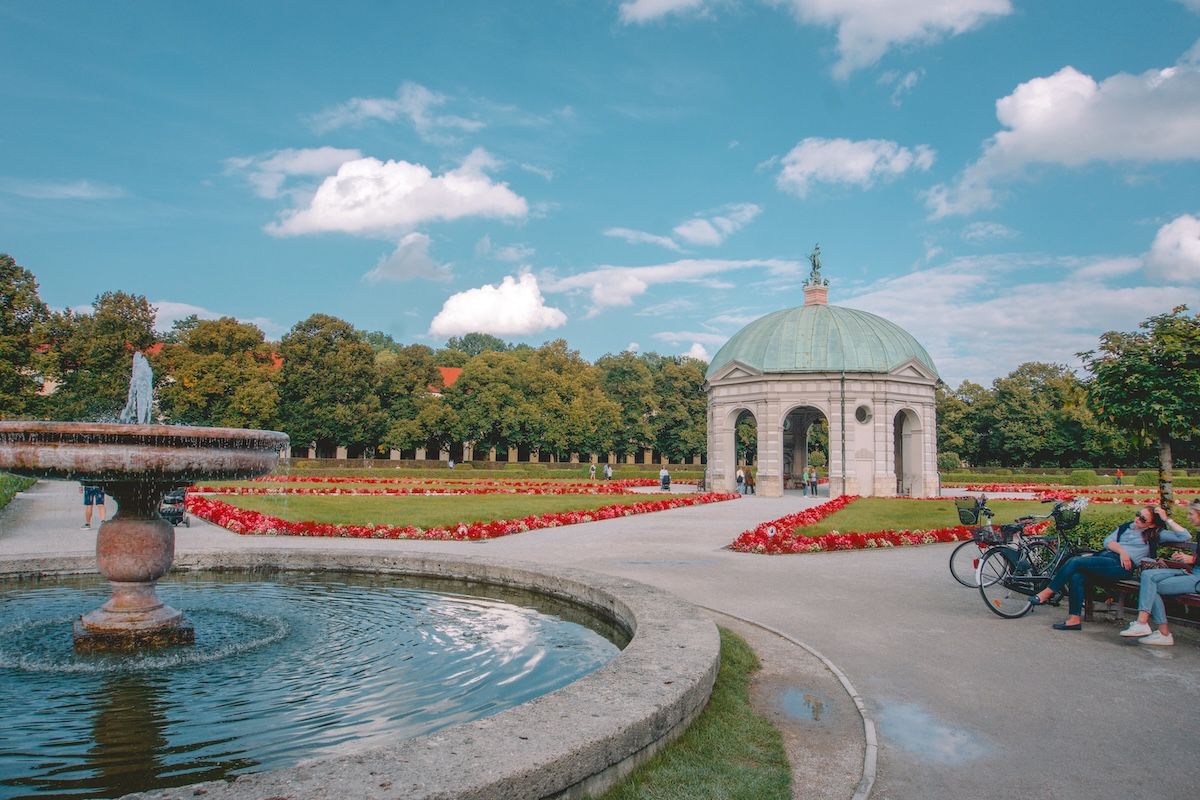
One of my favorite things to do in Munich is relax in a local park or garden for an hour or so after spending the morning in a museum. The Hofgarten (Court Garden) is close to the Residenz, making it a good spot to get away from the bustle of the Old Town without needing to use the subway.
The Hofgarten was formerly part of the royal residence. It was built in the 17th century in the style of an Italian Renaissance garden. It’s small but beautiful, and it’s surrounded by lovely buildings on all sides.
Stock Up on Local Coffee at Dallmayr
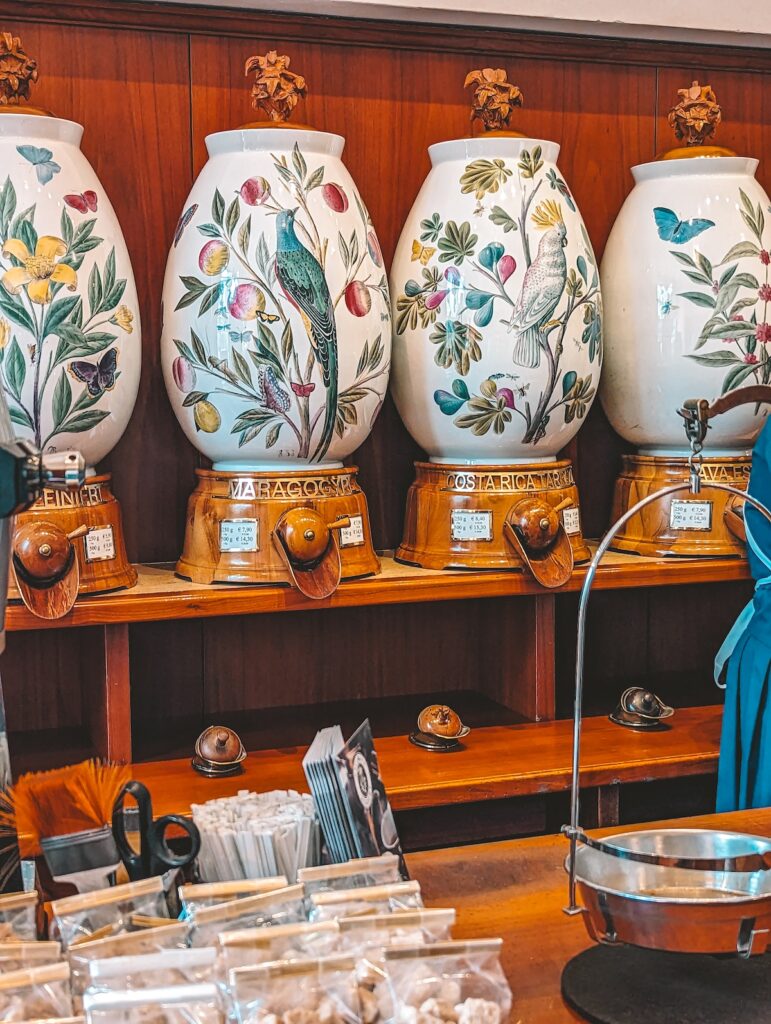
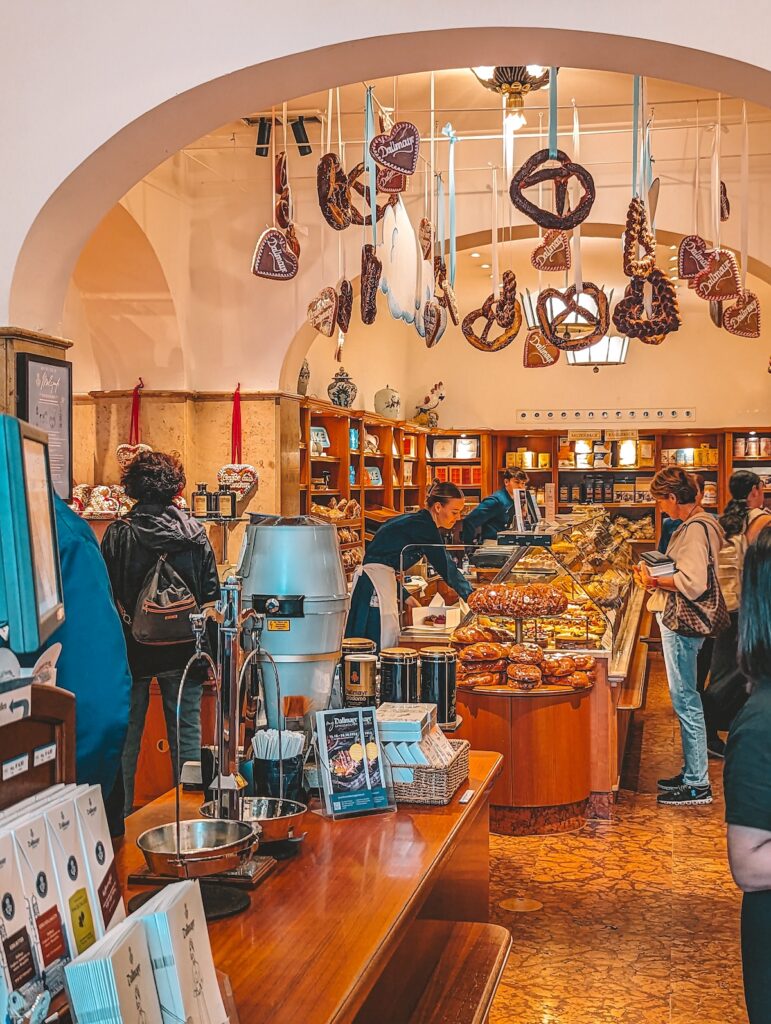
A more underrated place to visit in Munich is Dallmayr Delikatessenhaus. It’s a gourmet grocery store that sells all sorts of yummy foods, but what I want you to keep an eye out for is the freshly ground Dallmayr coffee.
You see, Dallmayr was founded in 1700, making it one of the oldest coffee companies in Germany. They sell Dallmayr coffee in grocery stores nationwide, but I suggest going straight to the source to buy a bag or two to take home as a fabulous souvenir from your time in Munich!
🚨 Attention: We’re now leaving the Old Town! 🚨
So far all of the Munich tourist attractions I’ve mentioned have been located in the Old Town. But believe it or not, there are still so many more places worth visiting in the historic city center!
Read my full guide to Munich’s Old Town for even more suggestions on what to do, see, and eat.
Explore the Trendy Gärtnerplatz District
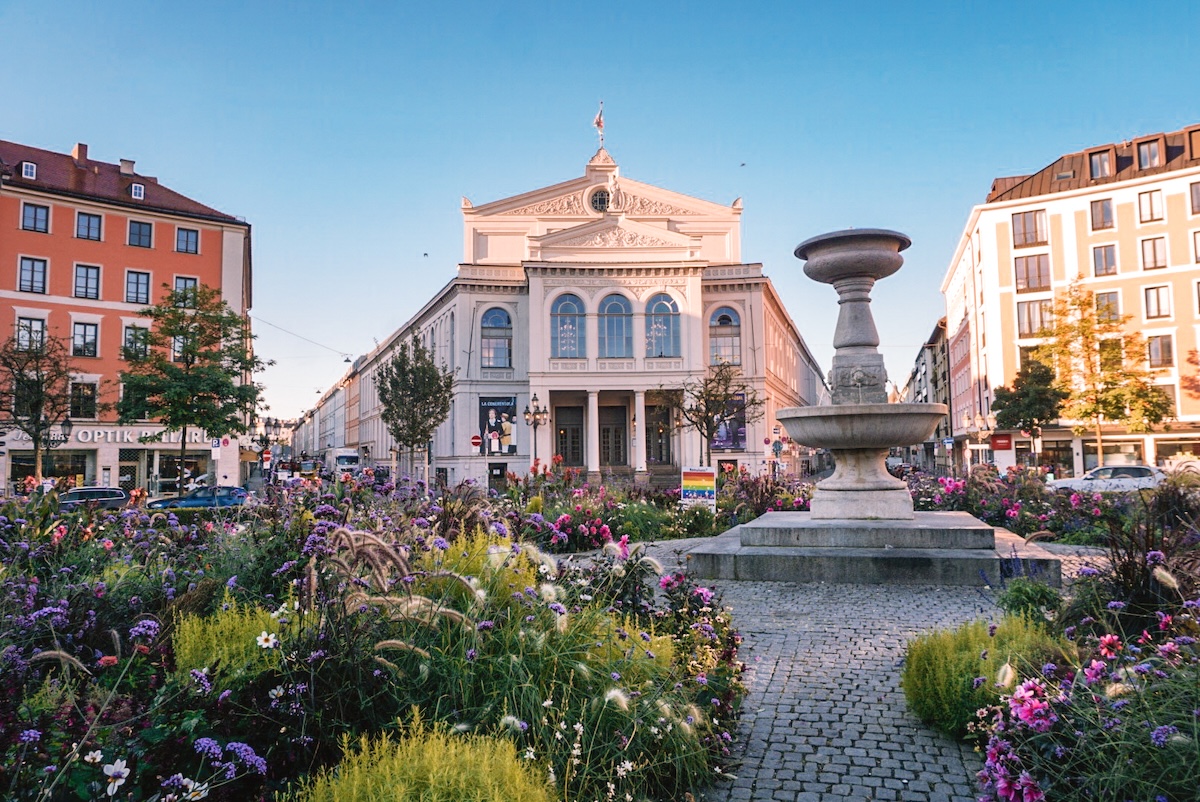
Just a short walk from the Old Town is the Gärtnerplatz neighborhood, which is especially known for its nightlife.
It’s a beautiful area of the city with a 19th century roundabout and fountain in the very heart of it. If you’ve been searching for more of a “locals only” neighborhood filled with cafes and boutiques, this is it!
Visit a Museum (All of My Favorites!)
There are many incredible museums in Munich, but the ones I think everyone should visit at least once are the Deutsches Museum, Bavarian National Museum, one of the Pinakothek Museums, and the free exhibit at the NS Documentation Center.
If you’re traveling on a budget, know that there are quite a few free museums in Munich.
Several museums also participate in “1 Euro Museum Sundays,” and that’s one of my all-time favorite things to do in Munich on Sundays, because who doesn’t love reduced admission to world-class museums?!
Deutsches Museum
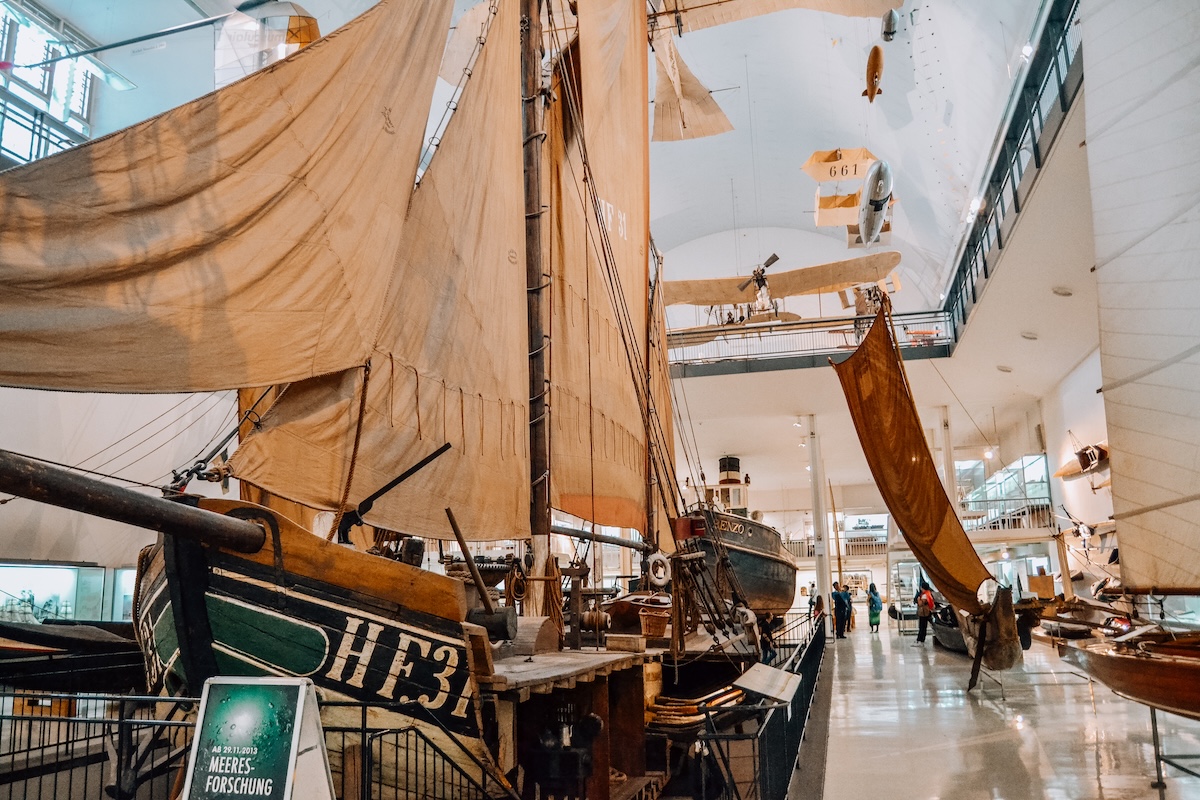
The Deutsches Museum is a science museum boasting exhibits in 53 subject areas ranging from chemistry to metallurgy to timekeeping to marine navigation to mining.
I won’t lie, the Deutsches Museum could probably use some updating. It looks like some of the exhibits were created in the ‘70s and never touched again, but in a way that adds to its charm!
The mine exhibit in the basement was my favorite. The entire basement level has been decorated to look like a mine, and it’s both very cool and very spooky.
I also recommend going up to level 4 to visit the amateur radio exhibit. The exhibit itself is small, but if you’re lucky there will be an amateur radio operator waiting inside, able to explain radios to you in person! I met a very nice elderly gentleman called Heino who talked to me about radios and amateaur radio operator culture for 30 minutes straight.
Claire’s Tip: Download the Deutsches Museum app to your phone. Some of the exhibits have text mostly in German, so the app comes in handy if German isn’t your mother tongue. (You can also book your tickets in advance here.)
Bavarian National Museum
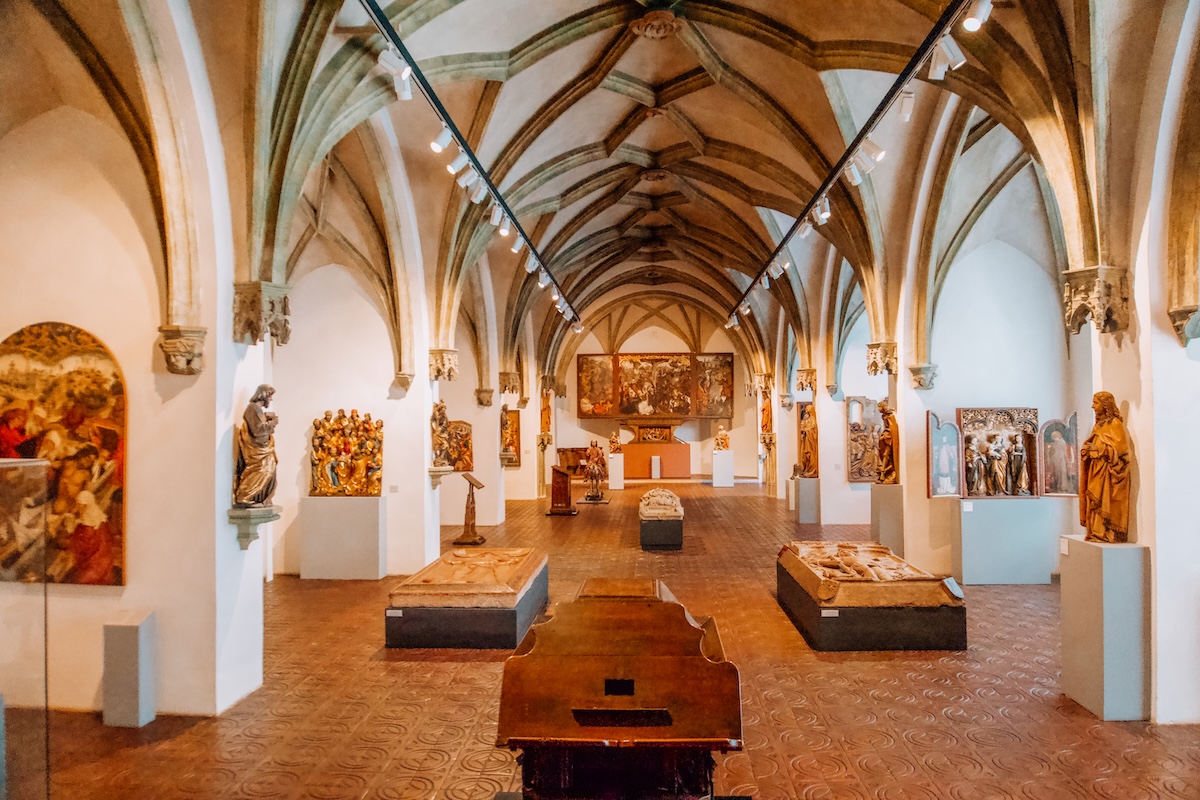
Founded by King Maximilian II in 1855, the Bavarian National Museum houses a large collection of sculptures and paintings, silverware and porcelain, musical instruments, and so much more that were originally part of the Wittelsbach family’s collection. I recommend setting aside at least 3 hours to see it all.
The Bavarian National Museum is near the English Garden, so consider coming here in the morning, grabbing lunch, then relaxing in the park.
Claire’s Tip: Many of the signs here are in German, so if you don’t speak German and want more information about the items on display I recommend asking for an audio guide at the front desk.
Pinakothek Museums
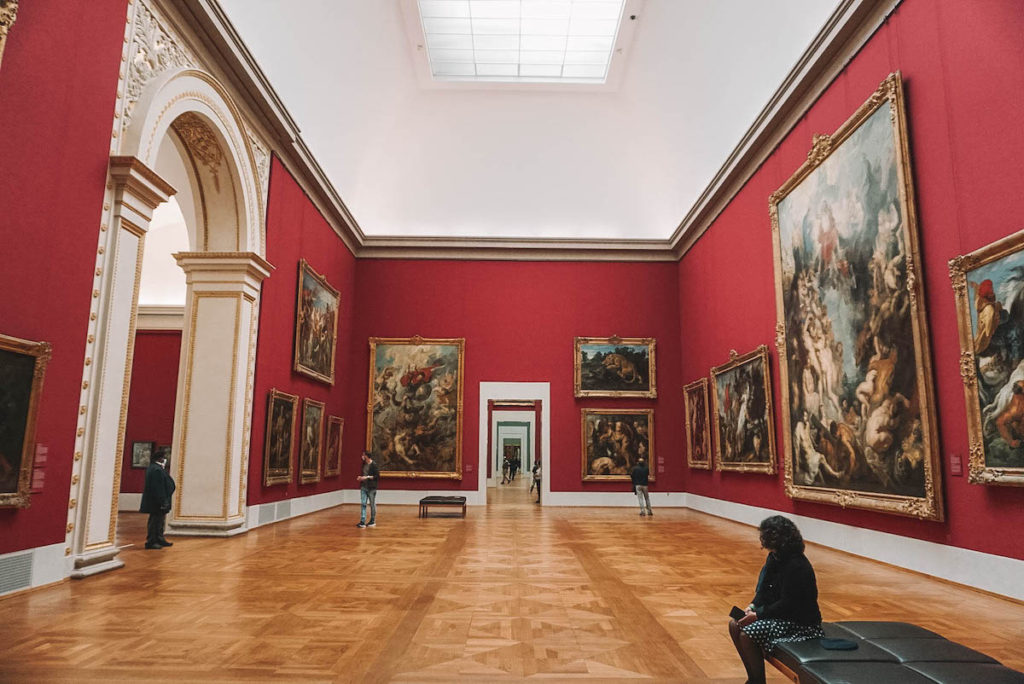
There are three Pinakothek Museums in Munich: the Alte, Neue, and Moderne. The Neue Pinakothek showcases 19th century art and the Moderne Pinakothek houses 20th and 21st century art.
During my last trip to Munich, I opted to visit the Alte Pinakothek, which is home to over 700 paintings ranging from the Middle Ages to the Rococo period. It’s one of those wonderful museums where the building itself is a work of art! The galleries are so beautiful, and the paintings are grouped together perfectly.
NS Documentation Center (nsdoku)
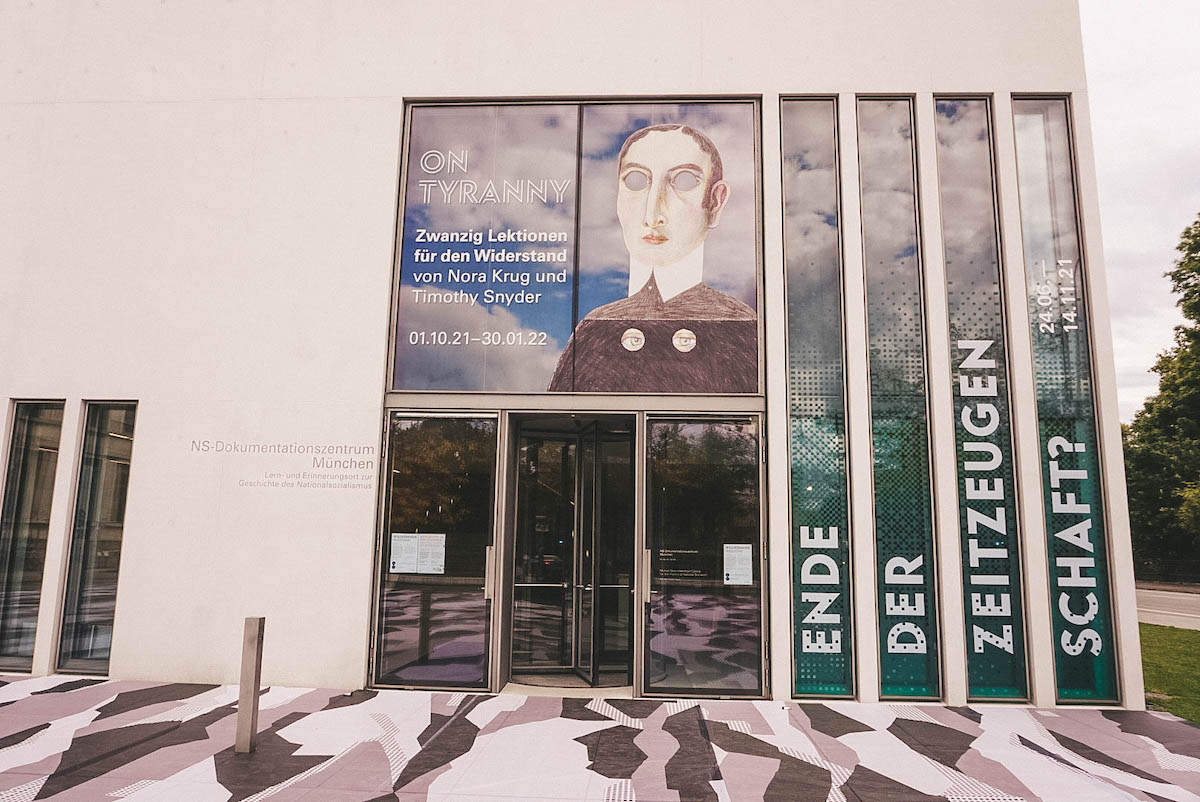
If you’ve ever wondered how Hitler came to power, this free museum explains it all.
Many people don’t realize that Munich was actually the starting point of the Nazi party. It was here that Hitler helped found the Nazi party, and the city was a Nazi hotbed throughout the war.
The NS Documentation Center doesn’t have any actual artifacts on display, but there is lots of information to read with accompanying photos and videos. If you’re unfamiliar with the history of WWII (specifically from the German perspective), definitely spend a couple hours here.
Enjoy a Liter of Beer at Munich’s Breweries
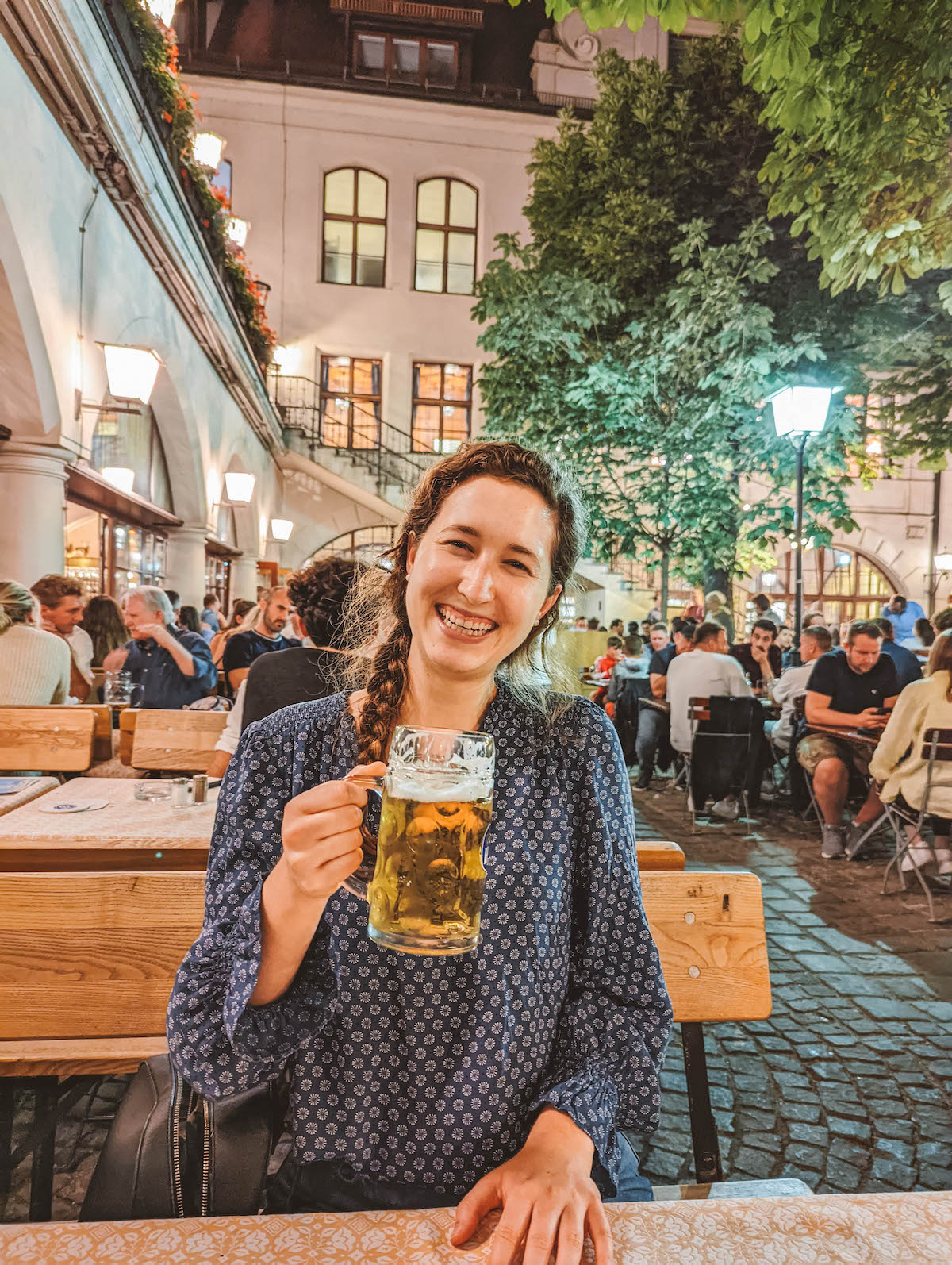
Yes, you read that right. In Germany, beer from the tap is served in one-liter steins or glass mugs and is meant to be enjoyed over the course of an hour or more.
While in Munich, you definitely need to enjoy a beer or two from one of the six major breweries — Hofbräuhaus, Löwenbräu, Augustinerbräu, Paulaner, Hacker-Pschorr, or Spaten-Franziskaner.
Note that Munich’s six breweries typically serve just the common beer varieties: Weissbier (wheat beer), Dunkel (dark), and Hell (lager).
The Hofbräuhaus is arguably the best known. It was established by Duke Wilhelm V in 1589 and it originally brewed beer solely for members of the royal court. You can visit on your own (I recommend nabbing a spot in the courtyard for maximum cozy beer garden vibes!) or you can book a guided tour that includes one beer.
Claire’s Tip: I rarely drink alcohol, but beer drinking friends of mine also assure me that Augustinerbräu brews some of the best beer in Munich. It’s Munich’s oldest independent brewery, and their location at Neuhauser Straße serves their beer straight from the barrel.
Walk Through the English Garden
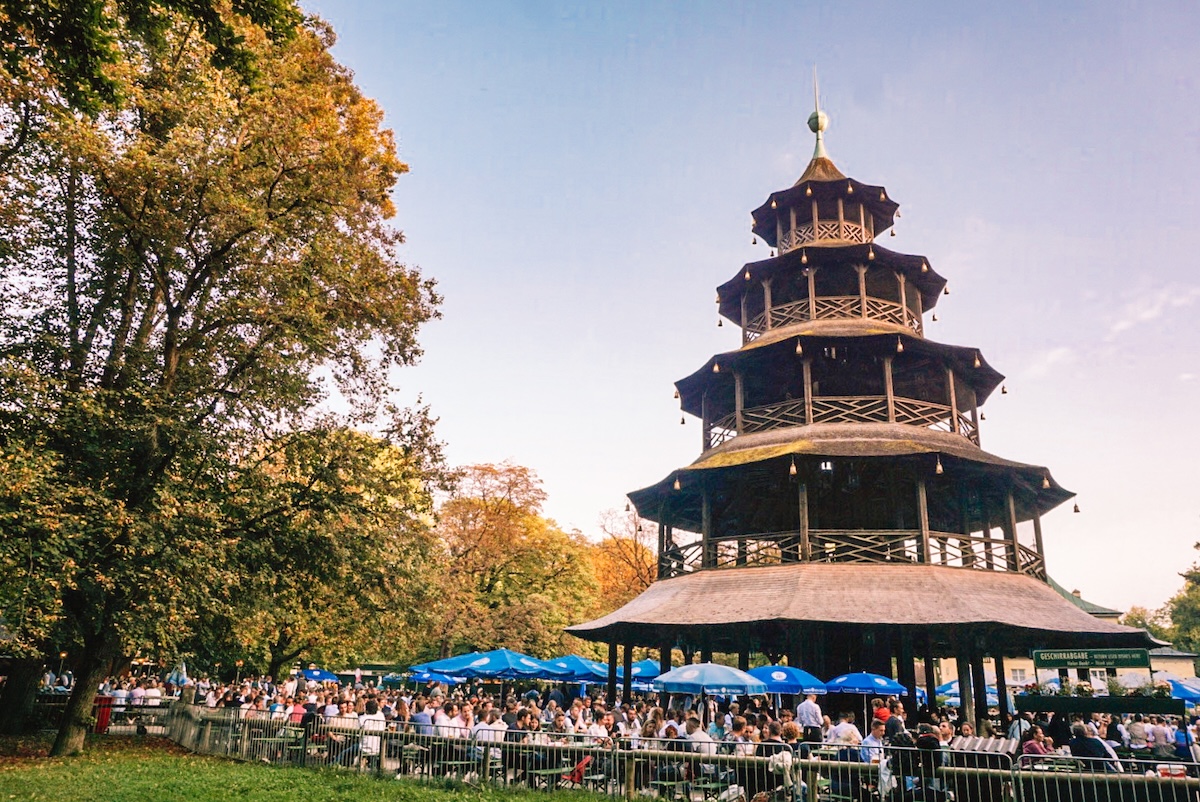
The English Garden is Munich’s largest public park, and as such is a can’t-miss attraction in the city center. It’s mostly open land with minimal landscaping and lots of trees and walking paths.
Its best known attraction is the Chinese Tower (Chinescischer Turm), which was opened in 1790. Surrounding the tower is Munich’s second-largest beer garden.
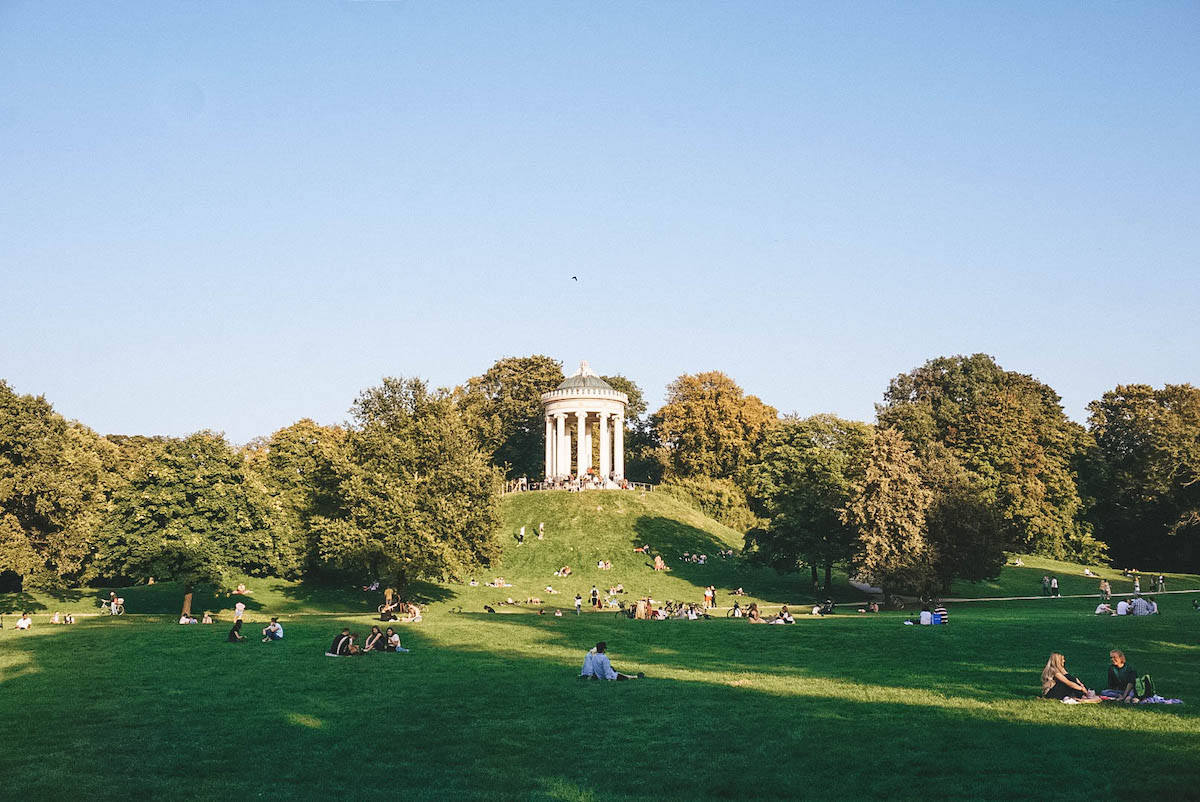
My personal favorite spot in the English Garden is the Monopteros, which is a small, temple-like building perched on a hill in the middle of the park. From the Monopteros, you have a great view of the park!
On a nice day, I recommend bringing a book in your bag and coming to the English Garden after spending the morning on your feet. Since the park is mostly open grass and trees, don’t feel like you need to “see it all” to say you’ve been to the English Garden. Find a shady spot to sit down, and just take it all in.
Claire’s Tip: Make Sure to See the Surfers!
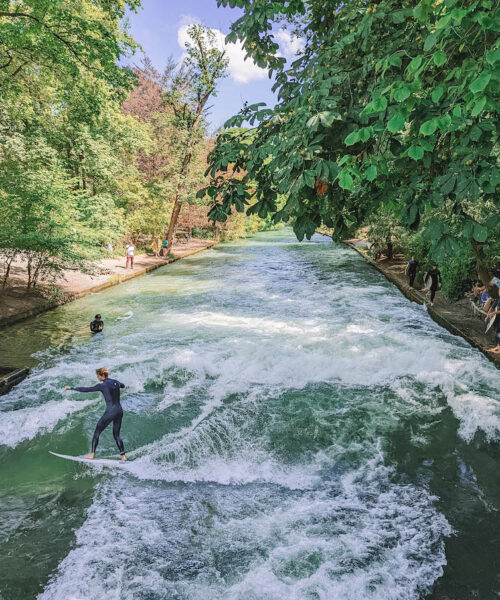
Running through the English Garden is the man-made Eisbach River, which has an artificial wave at one end where surfers like to ride the waves year-round. For the best view of the surfers, stand along the Eisbach Bridge (Eisbachbrücke).
Tour Nymphenburg Palace
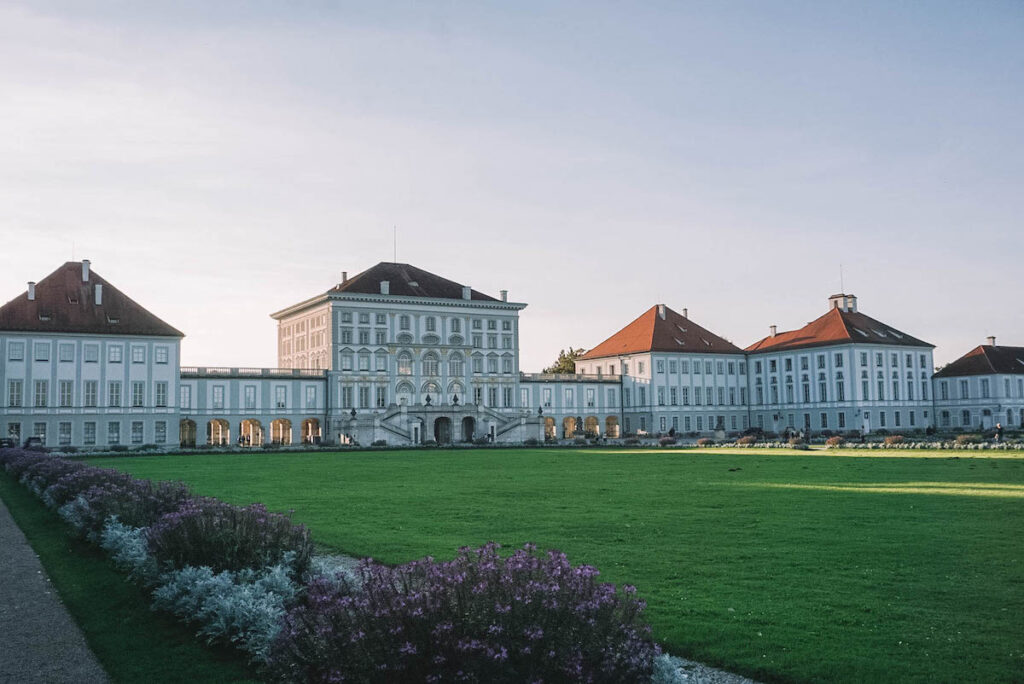
This just might be my favorite thing to do in Munich! Nymphenburg Palace is a stunning Italianate-style palace just 30 minutes from the city center.
It was built in the 1660’s as a summer residence for Elector Ferdinand Maria and his wife, Henriette Adelaide of Savoy. In the 1700’s, Elector Max Emanuel made significant changes to the summer palace. He added a beautiful garden in the Baroque style; it was at this time that the canals running through and around the palace were fitted. Max Emanuel also expanded the palace.
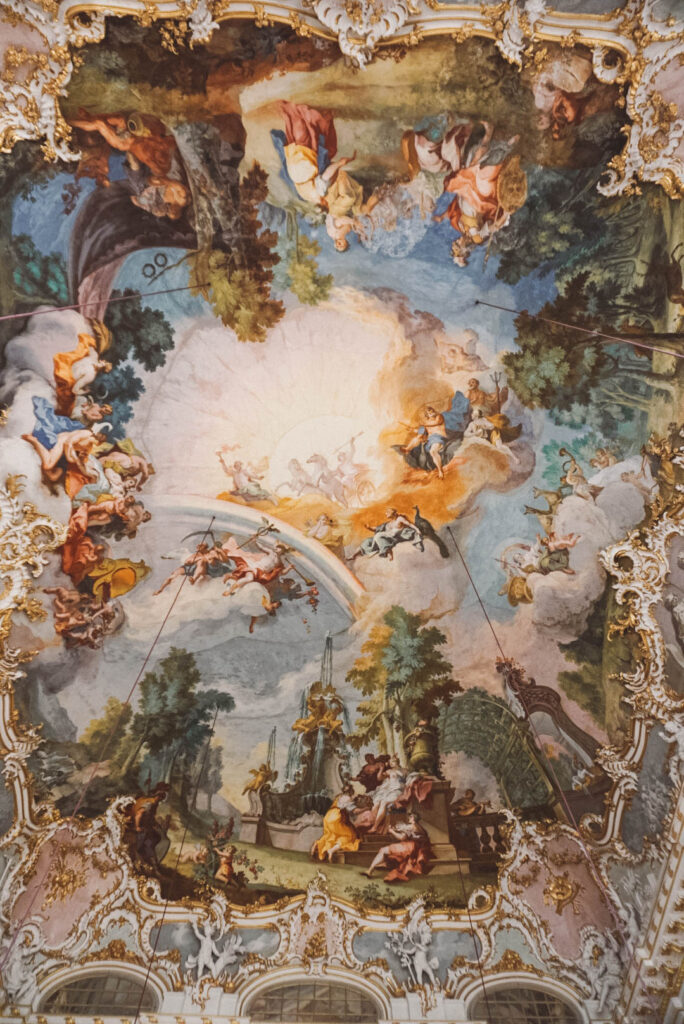
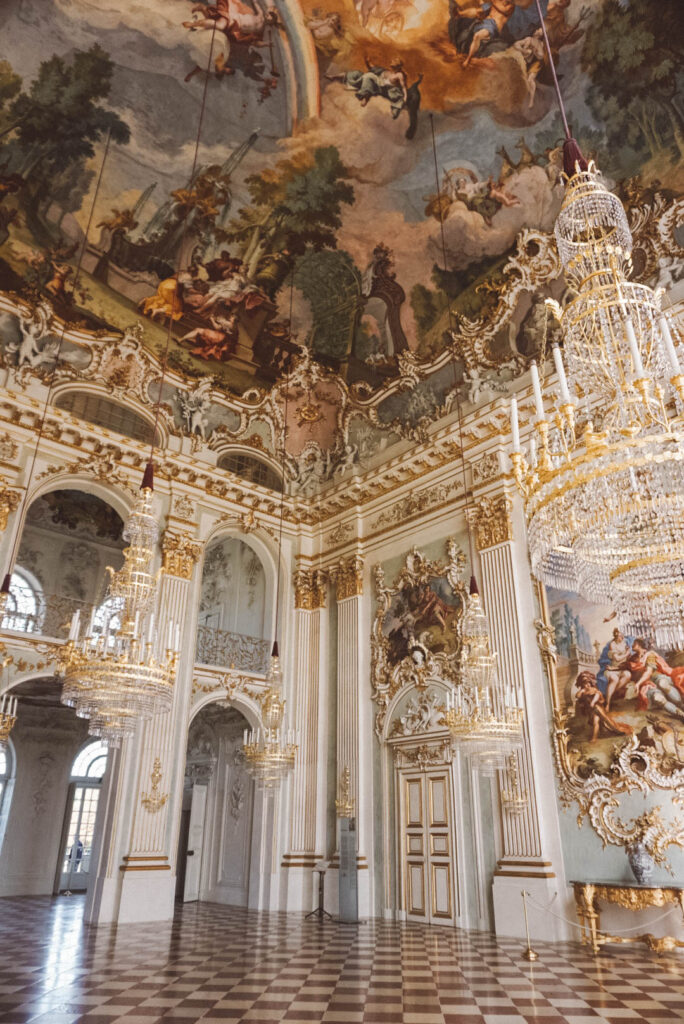
Additional kings and electors made changes to Nymphenburg Palace over the years, so you’ll see a variety of decor and architectural styles on your self-guided tour.
My favorite room was easily The Great Hall. It’s one of the few rooms in the palace that hasn’t been renovated or changed since its completion in 1758. The soaring ceilings, chandeliers, and brightly colored frescoes are truly breathtaking!
Claire’s Tip: Book your tickets for Nymphenburg Palace in advance to avoid standing in a long line.
Pay Your Respects at the Dachau Memorial Site
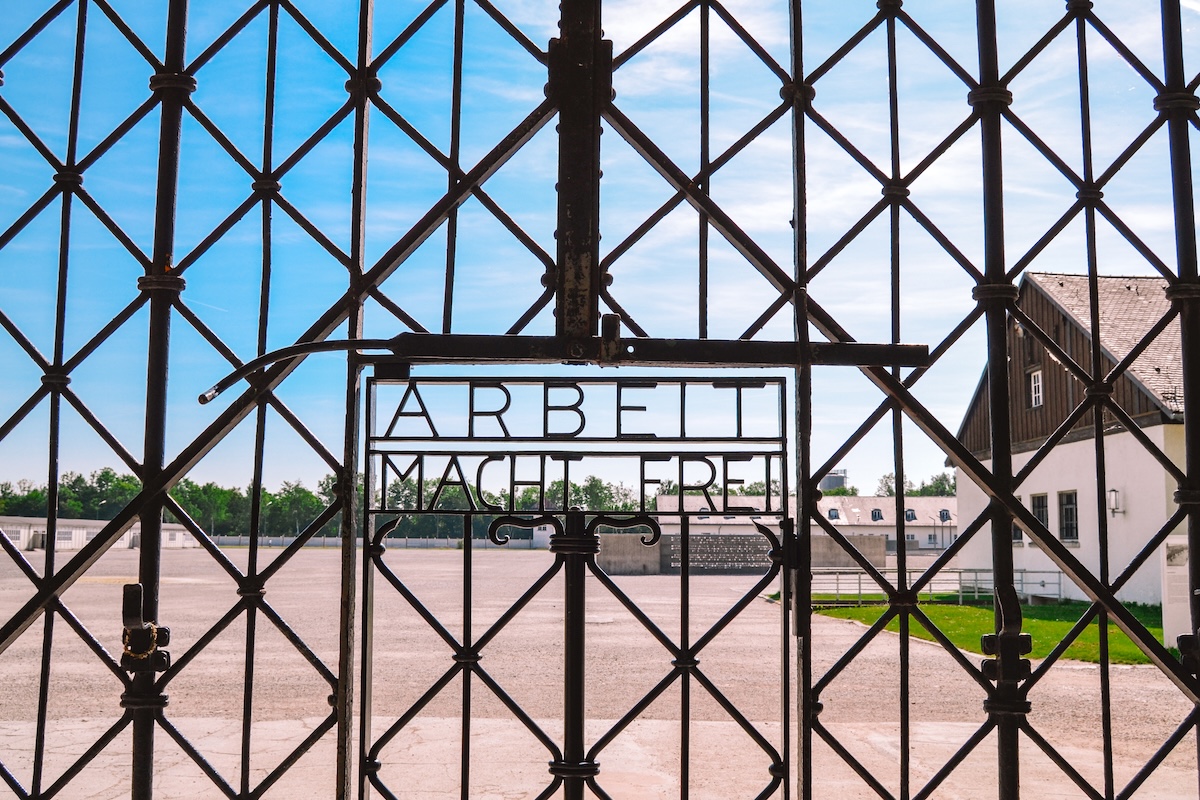
Since Munich was the starting point of the Nazi party, there were a couple concentration camps in the area. However, Dachau was the first. The Dachau Memorial Site was formerly the Dachau concentration camp.
It was the very first concentration camp built by the Nazis and it served as a model for all others built during WWII. It’s estimated that from its founding in 1933 until American troops liberated the prisoners from Dachau in 1945, some 41,500 people were murdered here.
Many of the original buildings are still standing at the memorial site, and some house exhibitions that explain the camp’s history and its victims in more detail. I highly recommend getting an audio guide as it goes into more detail than the signs.
Claire’s Tip: The Dachau Memorial Site is free to enter. It’s very easy to reach using public transportation, but you might find it helpful to book a guided day tour or half-day tour of Dachau to ensure you get the most from your visit.
Admire the View from the Olympiaberg (Olympic Hill)

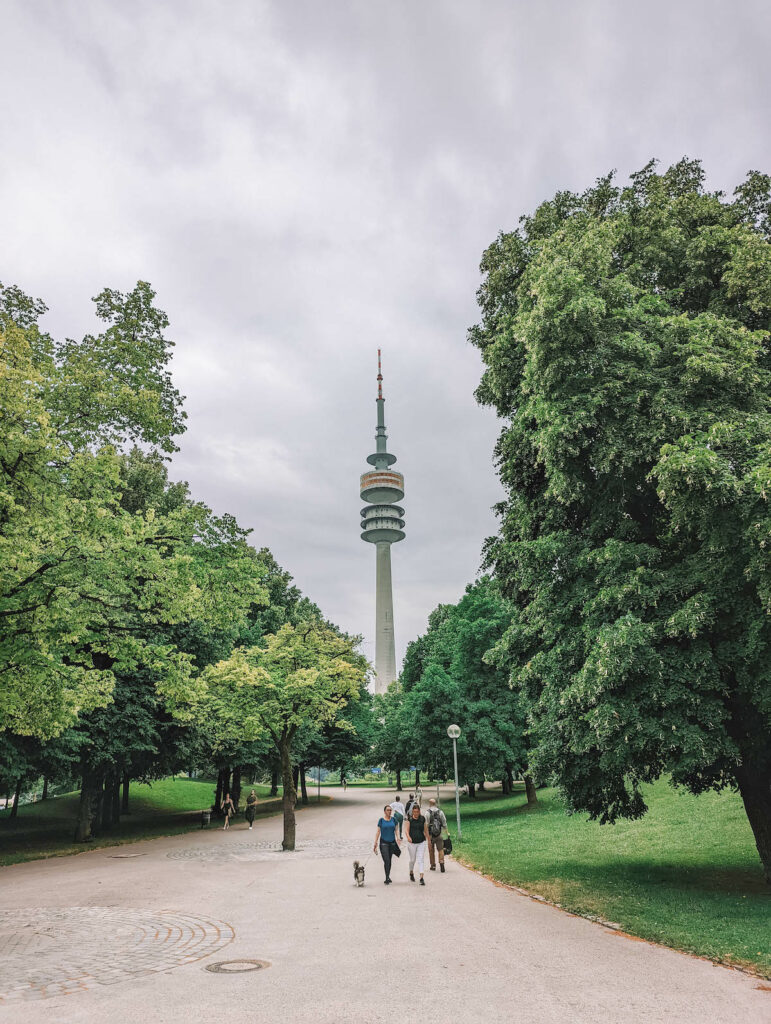
Built in 1972 for the summer Olympics, Olympic Park is a favorite attraction for both locals and visitors.
In the center of the park is a 60-meter-high hill called the Olympiaberg. It was created from the mounds of rubble that dotted the city center following the air raids of WWII.
The photo above sadly does NOT show the epic view from the top of the hill, because from the top you can see the entire park, parts of Munich, and even the Alps if the weather is clear!
Geek Out Over German Engineering at BMW World or Museum
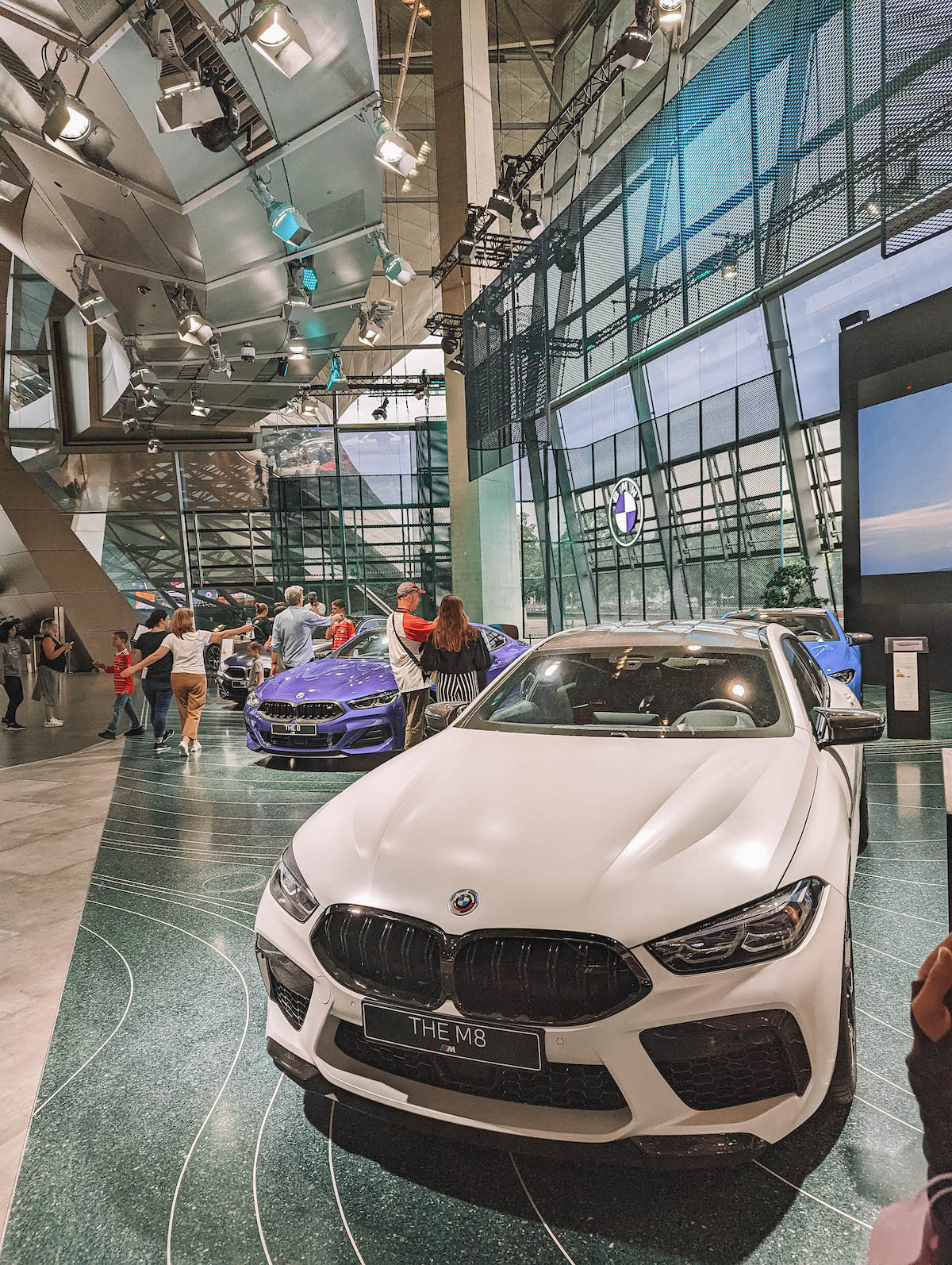
Ever heard of the little motorcycle and car manufacturer BMW? That’s the Bayerischen Motoren Werke, which is headquartered right here in Munich!
To immerse yourself in all things BMW, head to BMW World. It’s a free two-story exhibit space that shows off all the lates car and motorcycle models from BMW. (And yes, you can get behind the wheel for a photo op!)
For a more in-depth look at the history and future of BMW, pay to enter the actual BMW Museum nearby. I’ve not yet visited, but I definitely want to soon.
Interested in Taking a Day Trip?
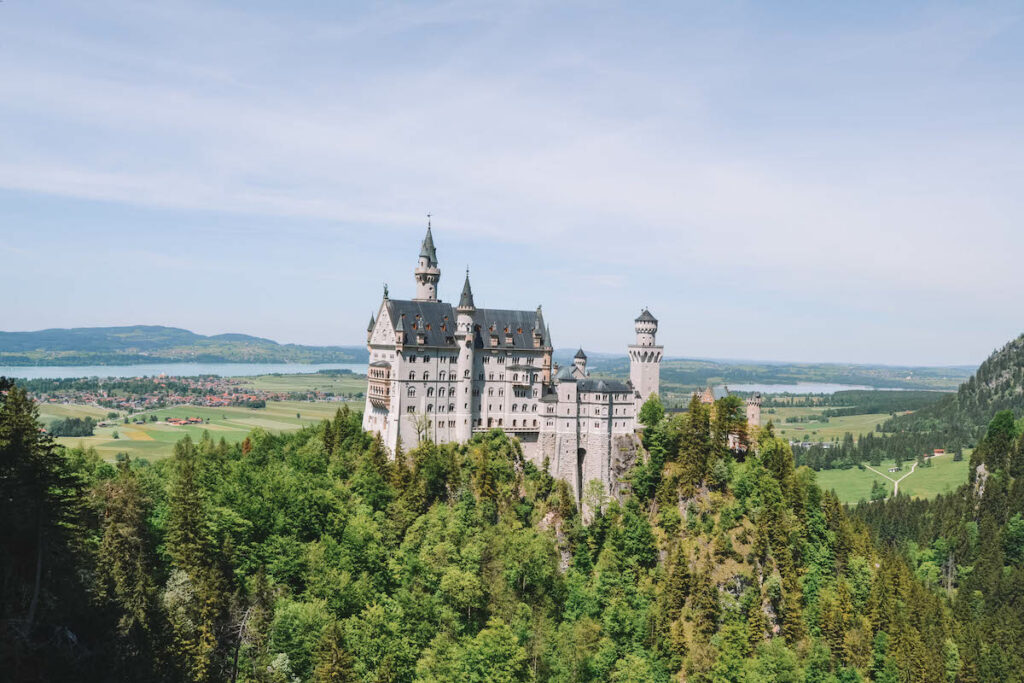
There are lots of day trips from Munich, and if I listed them all I’d have to write another 2,000 words for this post. Below are the Munich day trips I personally have taken in the past and can heartily recommend:
- Neuschwanstein Castle — “Mad King” Ludwig II’s fairytale castle. It takes about 2.5 hours to reach from Munich, but it’s worth visiting at least once in your life. You can either visit on your own or book a guided day trip that also takes you to the neighboring castle of Linderhof. I’ve visited the castle both ways and they both have their own pros and cons, so I suggest doing whichever sounds easier to you!
- Salzburg, Austria — 90 minutes by train. This stunning city at the foot of the Alps is where parts of The Sound of Music were filmed. You can visit on your own or book a guided day tour to see the sights.
- Bamberg — A teensy postcard-esque town about 1 hour 45 minutes away. You can see most of the town in a day (use this 1-day itinerary!) , but you’ll need to plan carefully since it takes a little longer to reach.
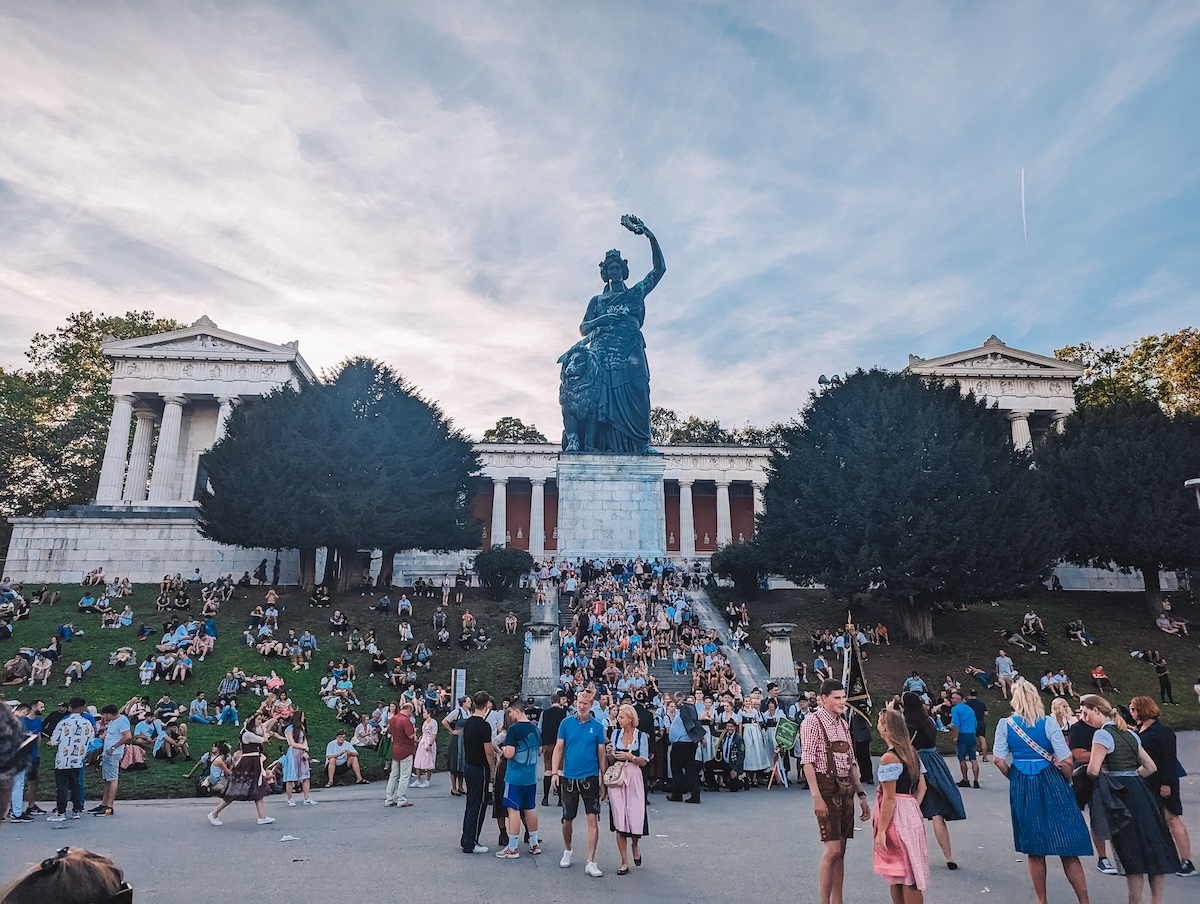
Excited to Visit Munich?!
Now that I’ve spent over 3,000 words gushing about Munich (gulp), I hope you’re pumped to explore the city!
If you have any questions about planning a trip to Munich, don’t hesitate to leave me a comment below! I’m always happy to help out where I can.
Don’t forget to follow me on Instagram to keep up with my daily adventures in Berlin and beyond!

All of My Free Munich Travel Guides
- All of my Munich travel guides!
- What to Do and See in Munich’s Old Town
- Detailed 3-Day Munich Itinerary for First Timer’s
- Easiest Day Trips from Munich by Train
- 20+ Free Things to Do in Munich
- How to Spend a Sunday in Munich (15+ Things to Do)
- Planning a Trip to Oktoberfest: What to Know Before You Go
Leave A Reply!